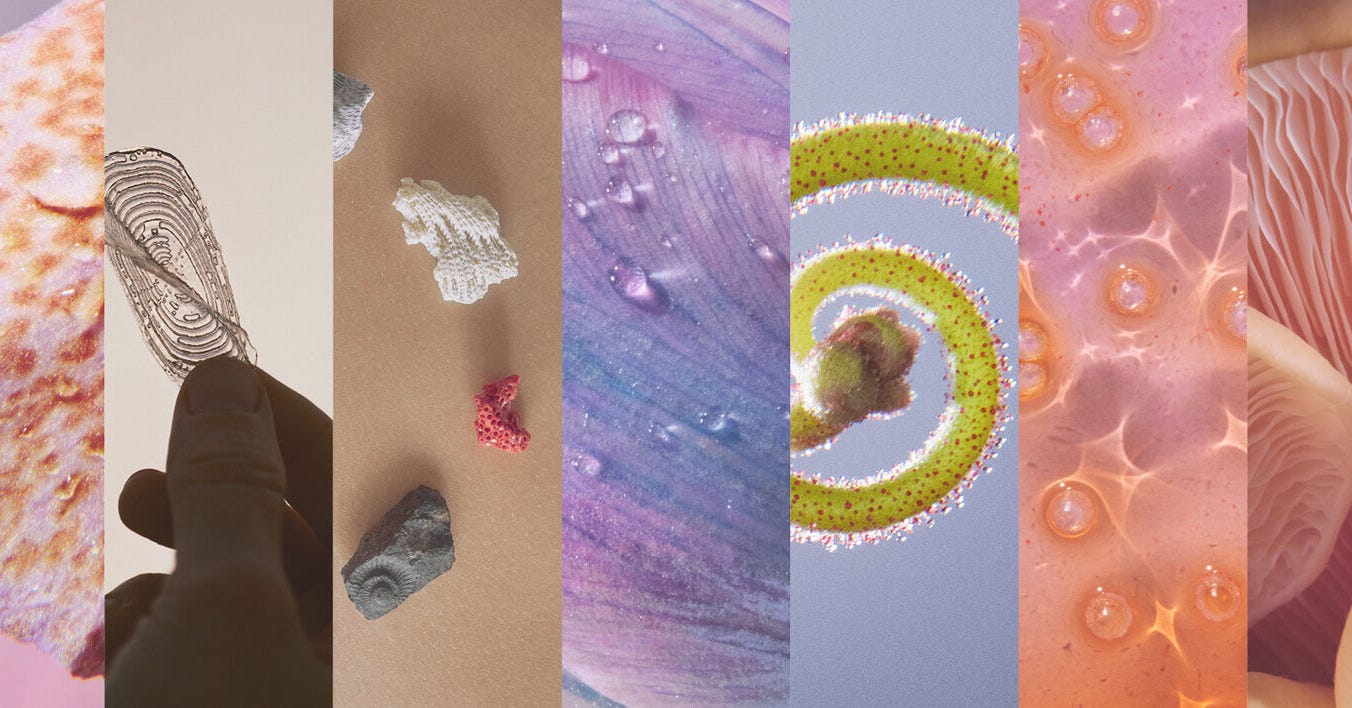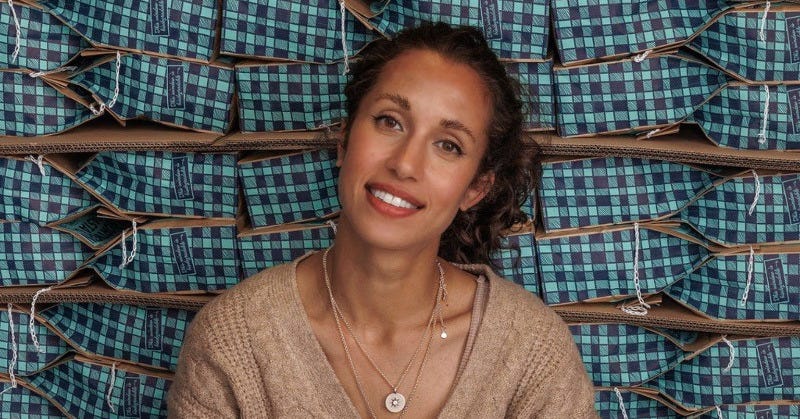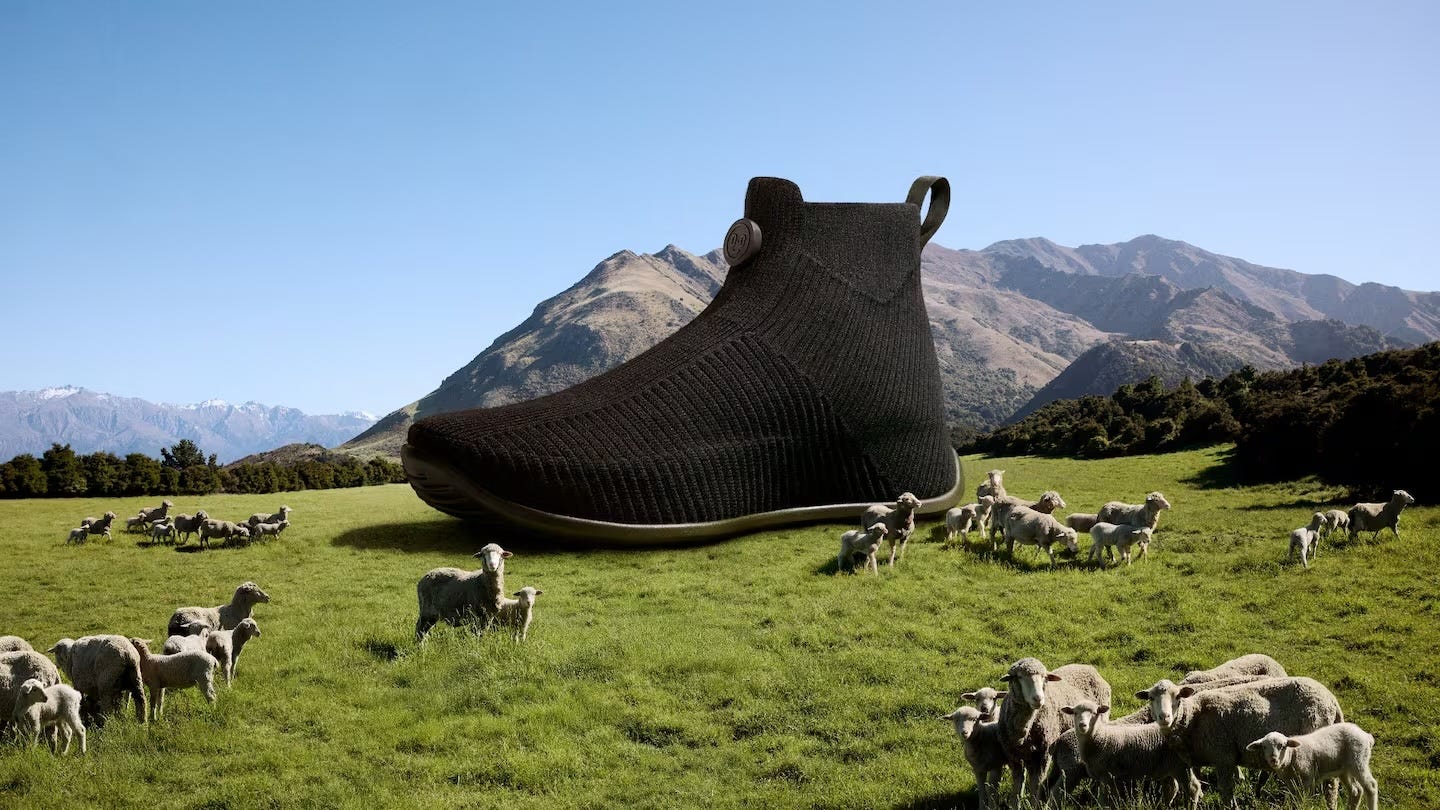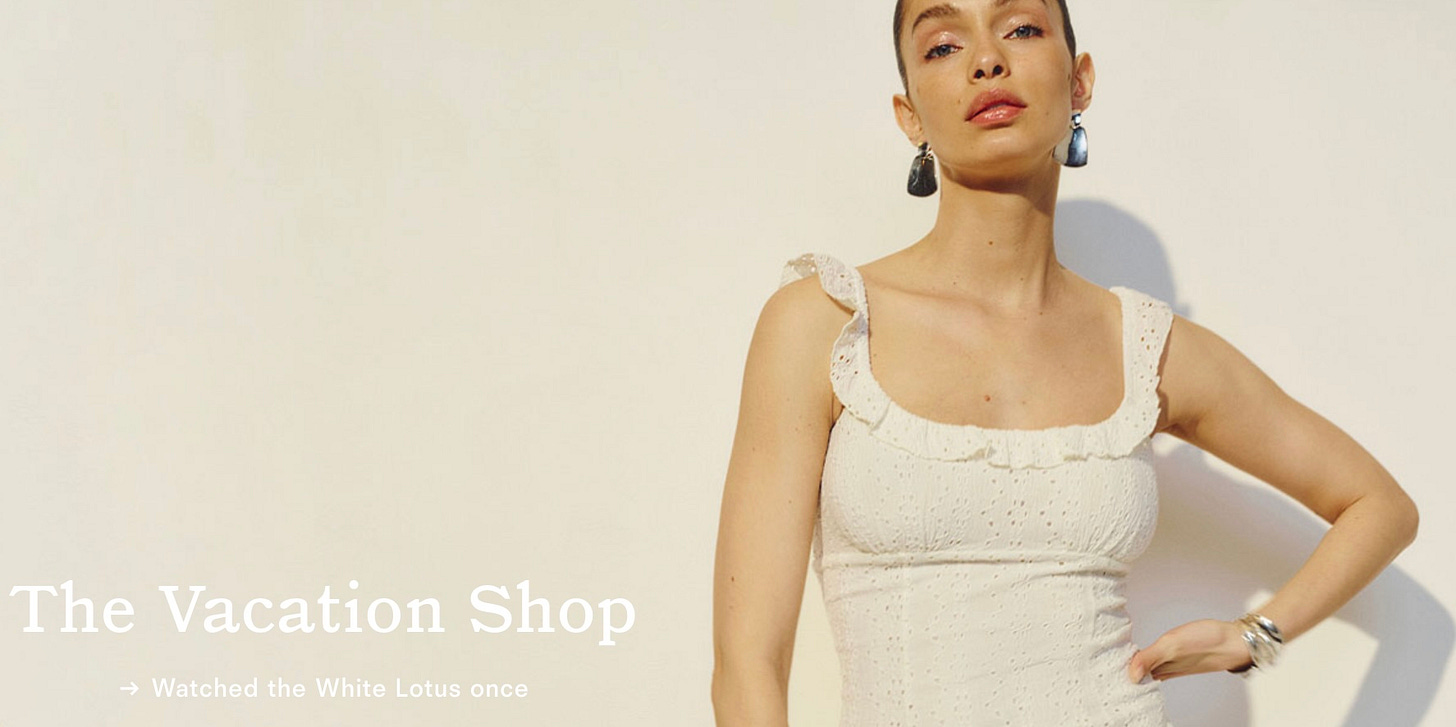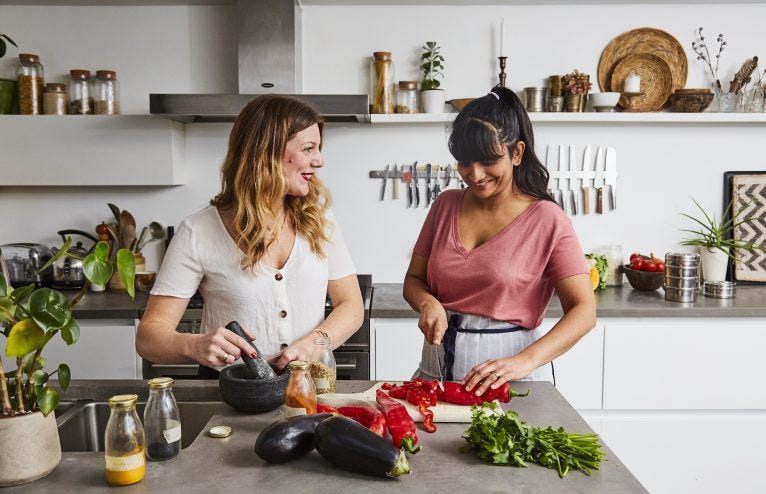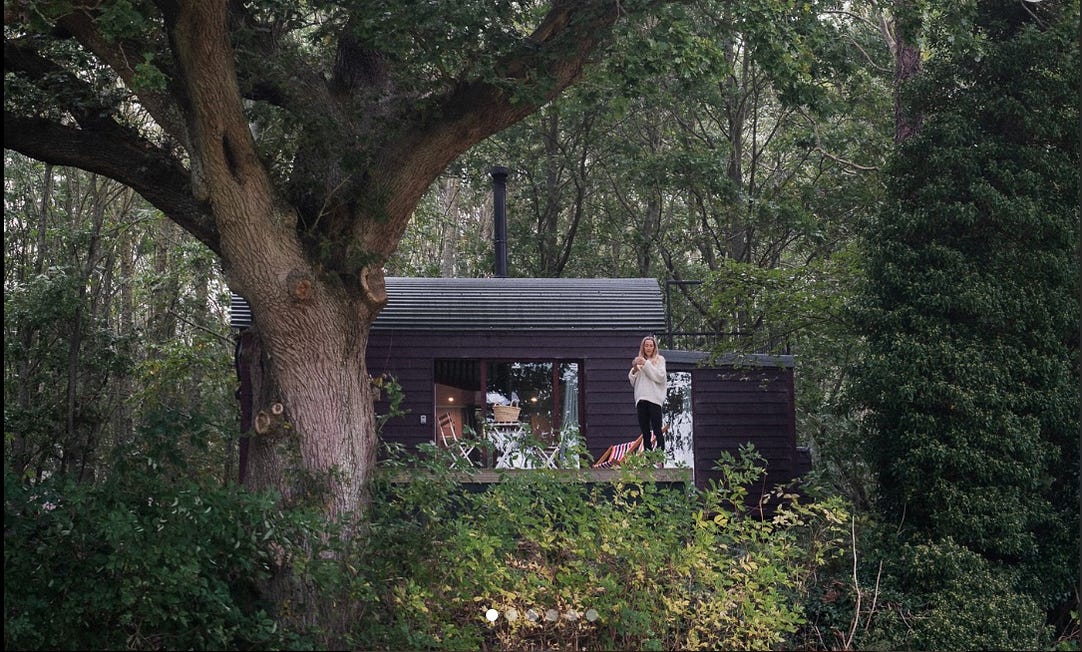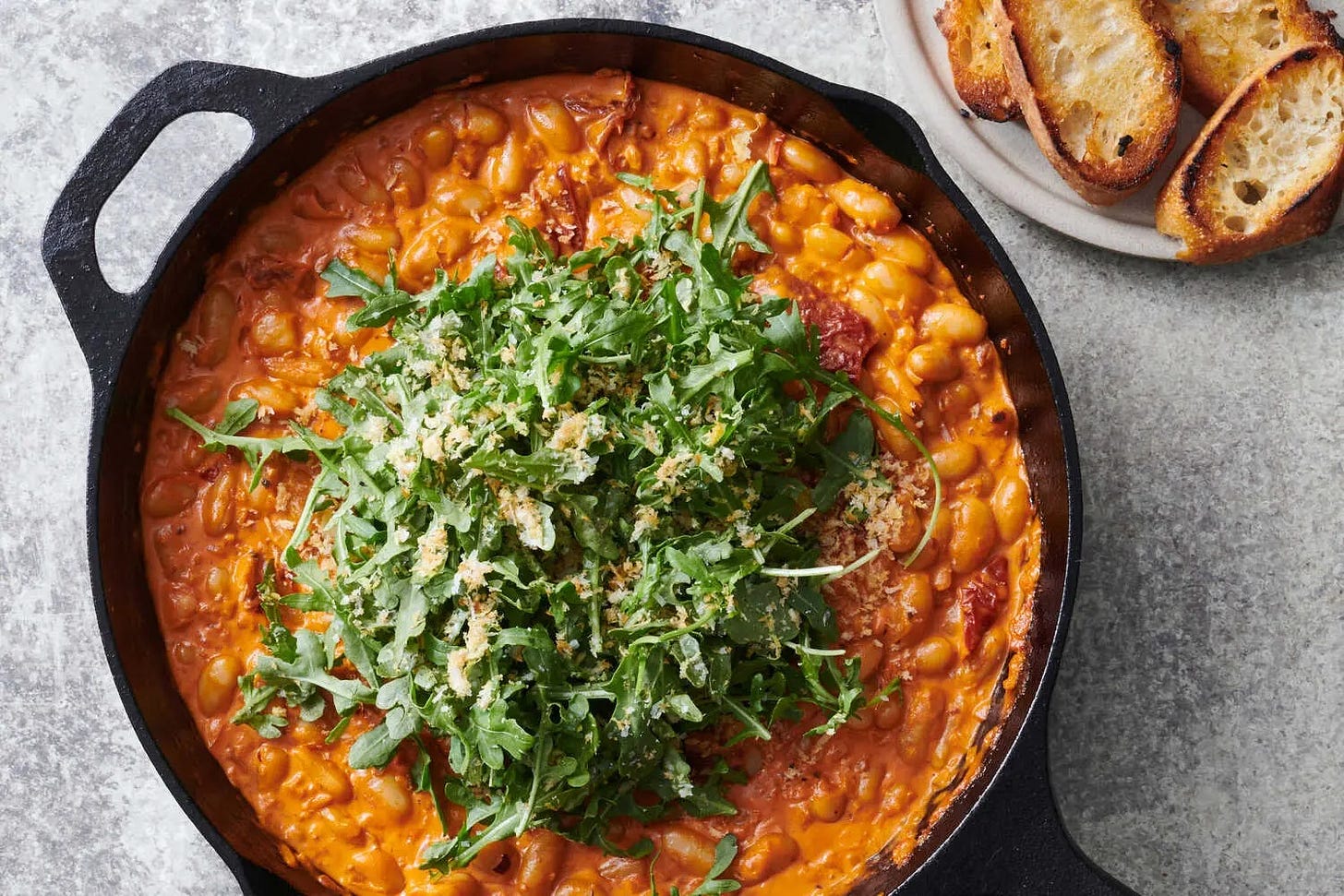🌍 Do people still care about sustainability? 🥱
Plus the beans recipe that went viral, White Lotus holidaywear and a tote with the most
First up, a quick call-out: ahead of the launch of our founder membership (more on that very soon), we’re gathering pictures of our original supporters – ie, you! – to show to the world that we are a collective at heart, via a photo wall on our soon-to-be-launched site. If you would like to be included, send over a lovely shot of you, being you (and starring only you, with clothes on) that you're happy for us to use. Ta in advance.
This week’s theme is… Do people care about sustainability? 🥱
Sustainability.
Sustainability.
Sustainability.
(We’re just putting our emphasis in different places for kicks.)
Excuse us while we wrap ourselves up in this word for once, since this is the first and only newsletter we plan to use it in (unless you say it in your BRiMM life questionnaires – no judgement here).
Why is it a banned word for us at BRiMM? Along with eco and green and so many other well-recognised words in the low-impact space that would frequently make our writing lives so much easier? Because – and this immediately goes to the heart of our theme this week – sustainability, as a word and a concept, has become one massive, buzz-killing turn-off.
We’re hearing this being said in the fashion world, in pieces such as BoF’s excellent ‘Can Brands Still Make the Case for Sustainable Fashion?’ from last month – more on that below – plus Brett Staniland’s latest Substack, ‘The New Way: Quiet-Sustainability: Selling Sustainability Without Saying It’ (subscribe for the full experience, he’s ace), and, by pure coincidence – hive mind! – BRiMM founder member Tiffanie Darke’s It’s Not Sustainable stack this week, ‘Me, Honestly’ (ditto re subscribing to hers – do it now). All of these articles highlight the fact that even many conscious consumers have reached Peak Sustainability, as demonstrated by the struggles of sustainability-first brands (we said we were going to use the word sustainability today, and we’re going for it).
But perhaps this isn’t necessarily anything new. Reports about the gap between what people say or feel and then do or buy have been published for a while now, with this slick Kantor white paper published in December 2023, and this December 2024 EY, Capgemini and InfluenceMap investigation being one of the most referenced. It’s just coming to more of a head now with viral pieces such as this LinkedIn piece from a few days ago: ‘Why Well-Off Brits Who Think Collapse Is Coming Still Stay Silent’. And it obviously doesn’t help that our returning leader of the trouble-making Western world has shifted – or is attempting to simply squelch – the sustainability conversation altogether with cries of greenwashing, woke capitalism and paper straws.
But enough with outlining the issues: how do we get past this hump of nose-wrinkling malaise? As Tiffanie puts it, brands need to “sell on desire”, with sustainability second. And on the tired term itself, she says, “people much prefer the word responsible to sustainable, as sustainability is very hard to achieve, but responsible takes in other things like animal welfare and fair wage to workers, implying a pathway as opposed to an endpoint.”
We need to use storytelling to recapture imaginations. (On that, check out this deep dive for more about how that approach can help environmental academics, plus this shorter Medium piece for how to be an amazing storyteller in general.) And people who do actually care about sustainability – because, in response to the title question of this newsletter, we do care – should read positive climate guides, such as the well-designed What If We Get It Right?, to reignite motivation.
For now, we’re bigging up some brands that don’t need to show-off about their sustainability, because it simply runs through the heart of everything they do, baked in, from the beginning – exactly as with BRiMM.
Tune in, team up and let’s turn the tide,
Team BRiMM
p.s. what are your fave indie coffee shops in the UK, or anywhere? Give them some love by sharing them with us so we can then highlight your list with the collective.
P.p.s. do you like this email? Why not forward it to a friend?
The BRiMM life questionnaire
Imogen Royall, founder, with her husband Matt Kenyon, of Northern Pasta Co, the divine pasta crafted from ancient, world-friendly grains, shares her low-impact living reccos
Second-hand store or market worth a mooch
“I LOVE second-hand shopping. The thrill of purchasing something that has its own history or story to tell. Holidays will always revolve around food and vintage shopping; some of the best I’ve done have been in Copenhagen. Closer to home I’m always refreshing our local Sell & Seek for furniture we do not need for a house that can’t fit anymore in.”
Plant-based dish of dreams
“Right now I’ve just got wild garlic on my mind, the woodland near us is full of it and it smells incredible. So I am thinking of a simple wild garlic pesto tossed through our Casarecce with a generous grating of sheep’s cheese. Preferably devoured while sat outside in the sun.”
What gets you every time
“I read this and three equally emotion-provoking things popped into my head. Dogs, no need to explain, cute, four legs, what’s not to love. A good view, the best way to get perspective. And a killer sandwich, a multi-layered, carb-enclosed, preferably with excessive mayo, sandwich.”
Watch out for the rest of Imogen’s answers on our site, launching soon
Fancy doing our BRiMM life questionnaire yourself? Get in touch
FROM THE COLLECTIVE
Chantelle taught us that magnolia leaves taste just like ginger: “chop them up in salads or make a syrup for baking (although taste-test first as some magnolia trees can be quite bitter)”. As the queen of waste reduction she says, "Nature is time and place"
Jennie introduced us to ToTravelTo.com, a startup aiming to make European rail travel easier, that also shares stories of people’s great low-impact journeys
Tiff flagged it’s the UN-designated #ZeroWasteDay today (Sunday 30 March), themed on fashion and textiles for the first time
We love to hear what our collective is finding. Share your links with Becky
WAS SUSTAINABILITY EVER SEXY?
… apparently yes, back in the 2010s, when startups were considered down for spotlighting their environmental and social consciences. Today, as explained in this nailed-it Business of Fashion scene-summarising piece from last month, it’s just “not as sexy any more” – confirmed by Eduardo Andrade, a professor of marketing at Imperial College London (anyone else imagining him giving a little ennui-heavy shrug, espresso held high as he uttered this?). The solution? To “treat the topic with a degree of irreverence and put the product first”. Which brings us nicely to the definitely down fashion brands we have next on our list…
WHITE LOTUS IS SEXY
… well, apart from its jagged edges of depravity (no season-three spoilers for anyone saving it all up). Or maybe that’s what makes it… sexy? We digress. We’re mentioning the white-hot-zeitgeist show because so-described Californian “hot-girl” brand Reformation currently has a vacationwear section inspired by it on its homepage. Yes, their sustainability message and legitimacy is communicated clearly, succinctly summed up in the tagline: “Being naked is the #1 most sustainable option. We’re #2.” (Ok, yeah sexy.) But the main thought you have when browsing the site is how understated and chic it looks and how just-so stylish the clothes are. It’s all: desire first; responsibility second. Scandi-cool brand Ganni, meanwhile, deploys another tactic: diverting its planet-positive innovations into off-shoot Ganni Lab, where, like mad professors unleashed, they go deep as they like into shoes crafted from sugar-cane resin or materials made from ocean litter. It’s no coincidence both these brands are multinational and super successful.
→ SEE MORE
DABBA DO
Before you even get to the zero-waste aspect of East London-founded Dabba Drops’ food deliveries by bicycle (available across zones 1 to 3), there are layers of stories woven around the brand to lure you in. First, there are, of course, the ‘dabbawalas’ – the iconic reusable stacked Indian tins that have “long been a… connection to home”. That’s founder and former TV producer Anshu’s childhood home, of Mumbai. Then there’s Anshu’s friendship with cofounder and restaurant ops pro Renée, a fellow mum and expat from New Zealand (here’s a lovely interview with them on Citizen Femme), and how they both recognised the need for a healthier takeaway for busy people. It’s “beautiful, soul-lifting and convenient” food (that, by the way, is good for the planet).
WELL-GROUNDED TRAVEL
Five years ago last week, The Travel Project – photographers Charlie, Jess and their little Sonny – resolved to completely stop flying altogether. Yes, to reduce their carbon footprint, but also to throw the focus of their wanderings into seeking out “a more realistic and achievable” type of exploration here in the UK, founding Achievable Adventures, a movement working to ‘alter the adventure space' and now a beautiful book, out in May. The reason their insta account is so dreamy? The gorgeous gloss of their videos and images, the quality of the destinations they uncover, the simple and authentic outdoorsy joy they seem to have: their more planet-positive, localised way of travelling is more, not less, aspirational; no sacrifice required.
EAT YOUR GREENS AND BEANS
This New York Times recipe has gone legit viral on Reddit, with various megathreads of people posting photos of their attempts, videoing themselves making it, sharing notes and making adjustments to the directions. Its main selling point, as this zany YouTuber puts it, is that it “turns a modest can of beans into a spectacular dinner”. Winner.
MUSIC IN TRIBUTE TO THE OG MAMA
In honour of Mother’s Day, James tips his hat to the ultimate: the planet that raised us
Carbon maths
The carbon footprint of an email depends what device you use to open it, but sending you this one used about 3.5g of carbon.


